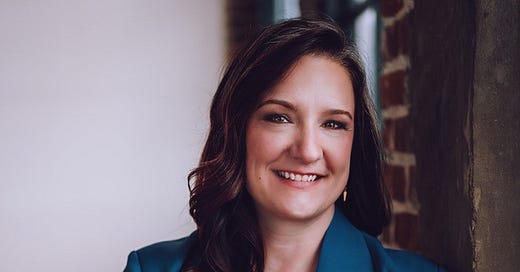Updates
Earlier this month, I had a wonderful time visiting the book club of my high school math teacher, Gina Goldstein, in Collegeville, PA. (Wow, math teachers do English stuff too! 😉) This was my first time meeting with a group that had already read the Life of Libby book. I really enjoyed answering questions about Libby’s experiences and our journey of writing the book!
If your book club wants to read Life of Libby, I’d be happy to make a guest appearance. (Just saying.)
My next event is at Hilltop Books in Chestnut Hill (Philadelphia) on Saturday, June 28 at 2 PM. I’ll be joined by an incredible author and historian Christina Larocco with her book Crosshatch: Martha Schofield, the Forgotten Feminist (1839–1916). Here is a brief excerpt from the book summary, “As an abolitionist, a women’s suffragist, and a white teacher of Black students, she spent a lifetime attempting to develop (however imperfectly) an antiracist feminist vision.” Hope to see you there!
Meet Alicia Scovill
Last month before Memorial Day, I had a chance to speak with Alicia Scovill—an Air Force veteran, construction professional, and advocate for veterans who are transitioning to civilian life. Before I met Alicia, I hadn’t given much thought to veterans. My social justice awareness developed in the context of peace activism. When it came to the military, we focused on nuclear disarmament, the financial excesses of military contractors (that could have instead addressed domestic needs), and the injustices perpetrated by military forces around the world.
In Life of Libby, Libby describes how the Bergen County Peace Center aggressively supported young men in finding ways to legally avoid the draft. I had an uncle who served in Vietnam, but my father wasn’t drafted, and my own experiences never brought me into close contact with veterans. I assumed that because many of today’s veterans had enlisted voluntarily, they didn’t need my attention.
The Invisible Veteran
Hearing Alicia talk about her own experiences in the military and her transition to civilian life made me want to learn more. She introduced me to three stereotypes that many non-veterans hold: the “Heroes,” the “Broken,” and the “Zeroes.”
The “Heroes” are the veterans that inspire movies like Saving Private Ryan. They depict veterans who are involved in combat, hitting important military targets, or rescuing fellow soldiers.
The “Broken” are visibly scarred by their service—physically, mentally, or both—and often struggle to function in everyday life.
Finally, the “Zeroes” are the veterans that are often unseen, which is why Alicia also refers to them as the “Invisible Veteran.”
Alicia explained that every role in the military is essential. The “Heroes” portrayed in movies couldn’t have done their jobs without the mess hall cooks or the logistics specialists who get supplies where they’re needed. Service members don’t choose their roles, yet many feel less proud of their service if they didn’t deploy or see combat. They might say, “I was in for four years but I just served food.” Or a neighbor with good intention might say to a veteran, “Thank you for your service. Where did you deploy?” If that veteran did not deploy, it can feel like their sacrifice was not important. Feeling unseen or dismissed contributes to the alarming suicide rate—especially among veterans who never deployed.
Difficult Transitions
Regardless of how we feel about war—or the way our government utilizes the military—veterans are the ones who raised their hands to protect our country. They made sacrifices to fulfill that commitment. Yet when they return to civilian life, many face an overwhelming transition—reentering a society that often doesn’t understand their experiences, challenges, or needs.
Employers make the effort to hire veterans, but often fail to create supportive work environments. What I learned from Alicia is that the military provides clear rules, accountability, and a deeply cohesive team environment. I’ve worked in many different environments and few reflect this experience. In contrast, civilian jobs can be confusing and isolating. While that can be hard for anyone, when veterans experience this contrast, they can lose hope.
What Works Better
Supporting veterans can actually improve the workplace for everyone. For example, Alicia recommends:
An onboarding process that sets clear expectations for the work
Events that build connections between co-workers and the managers
Fostering a culture of mutual accountability
These recommendations would help everyone in the workplace feel less anxiety and more connection. At the same time, veterans are especially vulnerable to failures in our workplaces, so it is important to raise awareness about their unique challenges. Alicia does this through writing, speaking, partnering with employers (primarily in the construction industry), and having countless one-on-one conversations with other veterans.
Veterans are our co-workers, friends, family, and neighbors. Which means helping veterans reintegrate into society strengthens families, workplaces, and communities.
If you are curious to learn more about the experience of veterans, you can reach out to Alicia on her LinkedIn profile: https://www.linkedin.com/in/alicia-scovill-a33a873a/. She welcomes opportunities for conversation.













Share this post